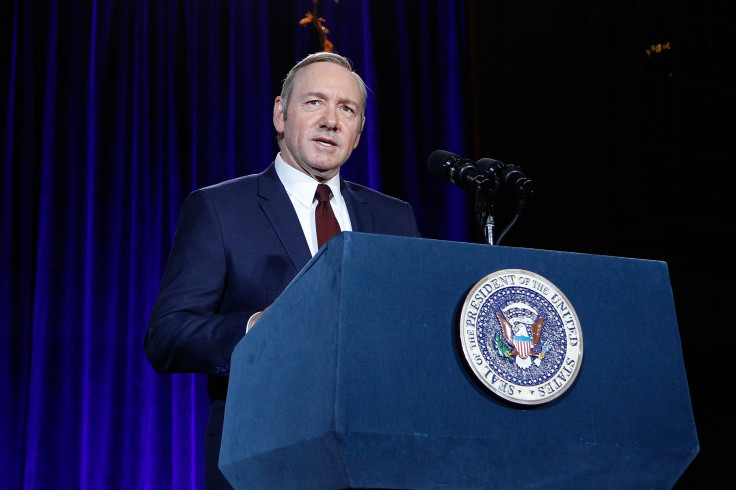Donald Trump Could Help Netflix's 'House Of Cards' Hit New High In Season 4

Sens. Ted Cruz of Texas and Marco Rubio of Florida have spent months attacking front-runner Donald Trump in an attempt to convince his supporters to give them their votes. Fictional candidate Frank Underwood would happily settle for their viewership.
The 2016 election is captivating the country's attention. Debates and stump speeches have become must-watch television, primary voters are turning out in record numbers and self-funded candidates have been able to raise millions of dollars, sometimes overnight, from individual donations. Through a series of clever ads and marketing, the Netflix series "House of Cards," which released all 13 episodes of its fourth season Friday, has jumped into bed with the campaign, but it's unclear if the political frenzy will result in a boost for the already-popular series.
"House of Cards" operates in a parallel America. Season 3 of the popular, Emmy-nominated show left off with its main character, President Frank Underwood (Kevin Spacey) navigating a difficult Democratic primary and readying himself for a contentious 2016 election. Season 4 explores his campaign for re-election.
Netflix debuted one of the first Season 4 teasers during a commercial break of the Dec. 15 Republican debate on CNN. The TV spot mimicked a campaign ad, featuring a montage of idyllic shots of rural America and multiculturally diverse supporters, as well as a narrator promising a bright future for the country.
“It’s a new day in America,” the narrator said. "Today, more people will go to work, return home to their families and sleep more soundly than ever before."
In fact, it was not clear the ad was for a TV show and not a spot for one of the actual presidential candidates until the final seconds, when Spacey's Underwood appears seated at his desk in the Oval Office.
"America, I'm only getting started," promised the corrupt politician. "I'm Frank Underwood and I approve this message."
The ad fooled many debate viewers and sparked buzz on social media, but is far from the only campaign-spoofing promotion employed by the show. Underwood has his own campaign website, FU2016.com (a not-so-subtle vulgar pun), which implores browsers to join the movement, download campaign themed wallpaper and Facebook cover photos, and watch clips from the show-turned-campaign promos. In February, the Smithsonian National Portrait gallery unveiled the "official" Underwood portrait. Throughout the election cycle, the "House of Cards" Twitter page has been sharing commentary and news about the election as if Underwood is a real candidate.
There's no room for doubt. #FU2016 https://t.co/KGXJr4xZRo
— House of Cards (@HouseofCards) February 23, 2016
Separately from Netflix, the show's star, Spacey, is lending his voice to CNN's "Race for the White House," a documentary series that explores the behind-the-scenes machinations of American electoral politics. The series is an independent venture, but the implications, intended or not, are clear: When you think about the election, think Kevin Spacey and, therefore, "House of Cards." After all, the idea was not CNN's idea, but the brainchild of Spacey himself.
"House of Cards" has adapted and exploited real life before. Season 3 drew attention for featuring a Russian president, blatantly modeled after Vladimir Putin, feuding with a Pussy Riot-inspired punk band.
During a press conference for the unveiling of the Underwood portrait, Spacey said his Netflix show and the actual election are "both a little bit unpredictable in that audiences have no idea where we’re going to go and what we’re going to do, and I think that’s part of the enjoyment that an audience has." He went on to underscore the show's desire to blend reality and television. "It’s really fun to blur fact and fiction to the point where no one f------ knows what’s going on,” the actor said.
"House of Cards" will not have to stretch all that much to blur that line with a presidential election demanding the world's attention through November. The debates in this campaign season have been earning record ratings, with as many as 24 million viewers tuning in during the most-watched contests. Even when Trump skipped a January debate held by Fox News in Iowa, a rally he held at the same time nearby still managed to draw nearly 3 million viewers on CNN and MSNBC. Such numbers would make even the most popular network TV shows jealous, and "House of Cards" would certainly welcome a slice of that pie.
Of course, Trump is unquestionably the biggest reason for all the increased attention on the primaries. The businessman's off-the-cuff approach and controversial remarks have made the Republican primary race the world's most entertaining reality show, and a politics-obsessed nation could give "House of Cards" a huge boost. Netflix does not release ratings for its shows, however, so determining the actual effect of the country's current political fervor on "House of Cards" viewership might remain elusive.
There have not been many other overtly political dramas in TV history to look at for precedent, but NBC's "The West Wing," which aired between 1999 and 2006, did not see any discernible spike in its ratings during election years in 2000, 2002, 2004, according to data from Nielsen.
In fact, the success of "House of Cards" Season 4 might still depend on, of all things, the show's perceived quality. "The West Wing" saw a standard decline in viewers with each successive season before seeing a more drastic drop-off after Season 4 following the departure of creator Aaron Sorkin.
Still, "The West Wing" aired in a different era, before social media forever altered the news media, before binge-watching allowed viewers to immediately satisfy their entertainment desires, and, maybe most importantly, before Trump was a presidential contender. The 2016 election is playing under new rules. Time will tell if it will catapult "House of Cards" to its biggest season ever.
© Copyright IBTimes 2024. All rights reserved.












